 Your new post is loading...
 Your new post is loading...

|
Scooped by
Gust MEES
|
Mit der Wendung «vom Dozent zum Coach» geht es um Rolle und Funktion lehrender Berufe – und damit auch um deren Identität in der Zukunft. Es geht um einen tiefgreifenden Umbruch im Berufsbild. Im hochschuldidaktischen Fachdiskurs ist schon länger deutlich, wie wichtig diese Entwicklung ist – in der Praxis sieht es teilweise noch anders aus. Solange sich Lehrende als primäre Informationsquelle sehen, als «Sender von Inhalt», solange bleibt die offene, digitalisierte Wissensgesellschaft zu erheblichen Teilen aussen vor. Hingegen entsteht starker Schub ins digitale Netz, sobald Dozierende sich in ihrer Haltung und ihrem Handeln zu Coaches entwickeln. Learn more / En savoir plus / Mehr erfahren: https://gustmees.wordpress.com/?s=coaching https://www.scoop.it/t/21st-century-learning-and-teaching/?&tag=Coaching

|
Scooped by
Gust MEES
|
Mastery-based learning, also known as proficiency-based or competency-based learning, is taking hold across the country. Vermont and Maine have passed laws requiring school districts to phase in the system. New Hampshire is adopting it, too, and piloting a statewide method of assessment that would replace most standardized tests. Ten school districts in Illinois, including Chicago’s, are testing the approach. In 2015, the Idaho State Legislature approved 19 incubator programs to explore the practice.
Learn more / En savoir plus / Mehr erfahren: http://www.scoop.it/t/21st-century-learning-and-teaching/?&tag=modern-education
Shifting to “Learn by Doing” Becker of NMC says just as the role of the teacher is switching from “sage on the stage” to one of a coach or guide, there is a shift from rote to active learning. To foster skills of teamwork and collaboration, online education is incorporating group projects and hands-on labs to help students think more critically and retain the content. Building on the concept of “learn by doing,” online education is expanding to connect students from around the world to learn together and meet professionals. Morris is also executive director of the Center for Interactive Learning and Collaboration, which partners with more than 200 cultural organizations, such as art museums, to offer real-time interaction with experts in various fields. This exposure can help answer student questions about the relevance of a geometry class, for instance. “To answer the questions of why you are doing it is key,” says Morris. “[Students] are motivated when they understand and have a reason to understand the material.” Learn more / En savoir plus / Mehr erfahren: http://www.scoop.it/t/21st-century-learning-and-teaching
Via Elizabeth E Charles, Yashy Tohsaku

|
Scooped by
Gust MEES
|

|
Scooped by
Gust MEES
|

|
Scooped by
Gust MEES
|

|
Scooped by
Gust MEES
|
When a new push to reframe educator professional development occurs, teachers often ask:
How does the PD help with specific curriculum requirements and standards?
How does it trigger additional professional learning opportunities?
How does it help the students in our classrooms and community?
How does it contribute to connections with other educators?
A collaborative platform that facilitates resource discovery and best practices gives teachers ownership of their own professional development. As personal learning networks expand, teachers achieve more recognition in their school communities and beyond.
Teachers organically organize collaborative environments, often finding one another through one or a number of the hundreds of Twitter chats that occur in any given week, or in locally organized EdCamps that are taking place throughout the globe. Blogs, webinars and conferences are also fruitful environments where educators can share ideas with one another.
Educators are also already taking advantage of the flexibility of online and interactive professional development to interact with peers and design programs based on their own interests. So why not build upon inquiry already taking place through blogs, Twitter chats, digital badges, Slack channels and interactive platforms?
Ultimately, it’s about empowerment and self-discovery through the expansion of personal learning networks, and the ability to blend in voices, concepts and tools from all over the world. Learn more / En savoir plus / Mehr erfahren: https://gustmees.wordpress.com/2015/03/15/professional-development-why-educators-and-teachers-cant-catch-up-that-quickly-and-how-to-change-it/ https://gustmees.wordpress.com/2015/03/28/learning-to-learn-for-my-professional-development-i-did-it-my-way/ https://gustmees.wordpress.com/2014/07/10/education-collaboration-and-coaching-the-future/

|
Scooped by
Gust MEES
|
Instructional Coaching According to Jim Knight, someone I work with as an instructional coaching trainer, up to 90% of what teachers learn alongside coaches will be retained. This means, that unlike traditional professional development where Knight's research shows that teachers lose 90% of what they learn, coaching can provide an enormous impact.
Knight's work is highly respected, and is highly respectful of teachers. Instructional coaching, in Knight's research and philosophy, is about working in partnership with teachers where the learning is reciprocal on the part of the teacher and coach. After all, we can learn a lot from one another.
In order for coaching to work properly, the school has to have a climate conducive to learning, which means that there needs to be a balance between risk-taking and rule following. It also means that teachers need to be able to trust that the coaching-teaching relationship will be confidential, something Knight believes both parties should come to an agreement on before the coaching relationship even begins.
Learn more / En savoir plus / Mehr erfahren:
http://www.scoop.it/t/21st-century-learning-and-teaching/?tag=Coaching

|
Scooped by
Gust MEES
|
Instructional Coaches:
1. Provide job-embedded professional development. . 2. Model and demonstrate highly-effective, best practices. . 3. Offer non-evaluative, objective feedback on a regular basis. . 4. Create an environment where student needs drive professional development. . 5. Offer guidance and feedback at the exact time teachers need it most - in the classroom. . 6. Inspire teachers to try new learning strategies and/or tools. . 7. Facilitate the transition from teacher-centered to learner-driven classrooms. . 8. Are site-based teacher-leaders who support both students and their teachers. . 9. Collaborate with teachers in order to engage students in innovative ways. . Learn more:

|
Scooped by
Gust MEES
|
Instructional coaches (IC's) are one group that are a bit more removed from students. Don't jump to any negative conclusions with that last sentence. What I mean is that, although they impact students in positive ways, they are a bit more separated from the consistent daily involvement that classroom teachers have with students.
Instructional coaches can have an enormous impact on the teaching and learning that happens in a school. Technology coaches help bridge the learning gap between teachers and technology. Content coaches can help teachers gain a better understanding of standards and subjects. Instructional coaches can help teachers improve their instructional practices in any subject at any time.
There are at least five reasons why schools should have instructional coaches. It's not that all teachers are weak and need help. It's about the idea that we all have blind spots (Otto Scharmer) and coaches can help others see their blind spots. According to this article in the New Yorker, even doctors have coaches to help them improve and see their blind spots.
Learn more:
https://gustmees.wordpress.com/2014/07/10/education-collaboration-and-coaching-the-future/
https://gustmees.wordpress.com/2015/07/19/learning-path-for-professional-21st-century-learning-by-ict-practice/

|
Scooped by
Gust MEES
|

|
Scooped by
Gust MEES
|
What is Coaching? Over 2,400 years ago, at the height of the Athenian enlightenment, Socrates asserted that teachers should help students to uncover information for themselves. This was a radical departure from the traditional approach of the time, which thought of students as empty vessels and of teachers as dispensers of information. The Socratic philosophy of teaching set the stage for coaching, which aims to unlock and increase potential and learning. Whether a coach is helping a teacher improve, or a teacher is using the same skills with students in the classroom, coaching allows for a constructionist theory of education. This allows for the individuals to create strategies for themselves. The Goal of Coaching Coaching is concerned with long-term skill development rather than with quick fixes or temporary understanding. We define coaches as those who offer inspiration, guidance, training, and modeling, and who enhance others’ abilities through motivation and support (Longenecker & Pinkel, 1997). The goal of a coach is to increase achievement by helping someone: - Find their inner strengths and passions in order to nurture self-worth and identity,
- Have a voice in their own learning and negotiate collectively with the instructor to create the goals and objectives,
- Passionately engage in talking content to increase memory retention and fuel motivation to learn, and,
- Use their inner talents to bring their work to the highest level of scholarship attainable.
Learn more:
https://gustmees.wordpress.com/2015/07/19/learning-path-for-professional-21st-century-learning-by-ict-practice/
https://gustmees.wordpress.com/2015/08/01/21st-century-education-is-learning-to-learn-for-life-long-learning-and-nothing-else-matters/
https://gustmees.wordpress.com/2014/07/10/education-collaboration-and-coaching-the-future/
|

|
Scooped by
Gust MEES
|
Coaches model skills and show athletes how to improve with practice. Feedback on student writing can work the same way.
Coaches teach athletes how to improve. But they don’t simply yell, “Play better defense!” What would that “feedback” really tell the player?
As teachers, we are our students’ coaches in the classroom. Providing vital, quality feedback is essential to helping students improve. Just as a coach has to show players how to box out under the hoop on the basketball court, teachers must model and explain to students how to improve their work.
I still recall sitting in a professor’s office to conference about my writing. He always provided examples of sentences to improve my work, often punching the keys of his typewriter so I could take the examples with me and use them. I often thought to myself, “This is awesome—the guy rewrites my assignment for me and I get an A.” What I didn’t realize was that he was teaching me how to write through meaningful, engaging feedback. Learn more / En savoir plus / Mehr erfahren: https://www.scoop.it/t/21st-century-learning-and-teaching/?&tag=feedback https://gustmees.wordpress.com/?s=coaching

|
Scooped by
Gust MEES
|
Teacher professional learning is of increasing interest as one way to support the increasingly complex skills students need to learn in preparation for further education and work in the 21st century. Sophisticated forms of teaching are needed to develop student competencies such as deep mastery of challenging content, critical thinking, complex problem-solving, effective communication and collaboration, and self-direction. In turn, effective professional development (PD) is needed to help teachers learn and refine the pedagogies required to teach these skills. However, research has shown that many PD initiatives appear ineffective in supporting changes in teacher practices and student learning. Accordingly, we set out to discover the features of effective PD. This paper reviews 35 methodologically rigorous studies that have demonstrated a positive link between teacher professional development, teaching practices, and student outcomes. We identify the features of these approaches and offer rich descriptions of these models to inform those seeking to understand the nature of the initiatives. Learn more / En savoir plus / Mehr erfahren: https://gustmees.wordpress.com/?s=coaching https://gustmees.wordpress.com/?s=professional+development

|
Scooped by
Gust MEES
|
Live and Learn
The great thing about self-directed, sometimes called informal, learning is that you own it. You determine what you want to learn, establish when the learning will take place, and have the opportunity to tailor it to your personal needs. There’s no forced curriculum, there are no required exams, and there are absolutely no grades — except the ones you give yourself. Your only test is how much knowledge you’re able to soak in and apply to your professional and personal life.
The world is at your fingertips. All you have to do is open your eyes and ears and begin taking it all in. The fact is, learning is as much an attitude as it is an activity. As the Buddhist proverb says, “When the student is ready, the master appears.”
So, promise yourself to begin today. Open your mind to new horizons — energize yourself by connecting with the world around you — and promise yourself that you’ll strive for excellence. It’ll change your perspective, it’ll change your potential, and it’ll change your life.
As Vernon Howard once said, “Always walk through life as if you have something new to learn and you will.” Live and learn! Learn more / En savoir plus / Mehr erfahren: https://gustmees.wordpress.com/?s=coaching https://www.scoop.it/t/21st-century-learning-and-teaching/?tag=Learning+2+Learn https://www.scoop.it/t/21st-century-learning-and-teaching/?tag=Life-Long-Learning https://gustmees.wordpress.com/2015/03/28/learning-to-learn-for-my-professional-development-i-did-it-my-way/

|
Scooped by
Gust MEES
|
In a blog post, Bill Gates explores personalized learning. Not only do kids get to learn at their own pace, which gives them more confidence, but teachers at Summit get matched with students who they'll mentor for all four years. Instructors can use in-house software to see which of their dozen or so students has completed certain assignments and exams. The end result is that kids don't have many opportunities to slip through the cracks. And by taking an active role in their education, they learn responsibility and self-reliance.
Via Oliver Durrer swissleap.com

|
Scooped by
Gust MEES
|
For those not familiar with self-directed learning, they sometimes have a stereotype about what it means to be a self-directed learner. One of them includes this vision of the solitary and independent learner who does things her way. She only depends upon herself, not relying upon teachers or others. Yet, in my study of self-directed learning, that tends to be far from true. In fact, many self-directed learners actively seek out different guides and mentors in their pursuit of new learning goals. They own the learning, but they seek out mentors and guides to accomplish their learning goals.
Self-directed learning is not solitary learning. It is not anti-teacher, anarchist, nor is it selfish. At least that is not the vision for most advocates and champions of self-directed learning. What makes it distinct is that the learner, not a teacher or other authority, takes increasing ownership for the what, why and how of learning. It stems from a conviction that teaching self-sufficiency and self-regulation is effectively done by providing contexts where one is able to practice self-regulating and being increasingly self-sufficient. Learn more / En savoir plus / Mehr erfahren: http://www.scoop.it/t/21st-century-learning-and-teaching/?tag=Heutagogy Andragogy | Adult Teaching: How-To Teach ICT!? | PracTICE LEARNing To LEARN For MY Professional Development | I Did It MY Way https://gustmees.wordpress.com/2012/06/27/how-to-use-twitter-with-success-for-education-and-more/ https://gustmees.wordpress.com/2013/02/20/what-you-should-know-about-twitter-chats/ https://gustmees.wordpress.com/2014/07/10/education-collaboration-and-coaching-the-future/ http://www.scoop.it/t/21st-century-learning-and-teaching/?tag=Peer-to-Peer-Learning

|
Scooped by
Gust MEES
|
A Checklist For Today's Teachers | #ModernEDU

|
Scooped by
Gust MEES
|
The National Commission on Teaching and America’s Future indicates that more than fifty percent of those entering the profession will leave within the first three to five years.
Nine years ago, the Harrington Park School District in New Jersey started down a path of reevaluation and self reflection, when we realized that we were in danger of losing teachers. We needed to “reevaluate the evaluation”—to figure out how we could bring teachers together over evaluation, as opposed to driving them apart. The answer? The Self-Directed Growth Plan (SDGP)—an approach to teacher evaluation and student growth measurement that allows for a continual state of growth and change that effective teachers desire to gain.
The scope of future plans for the SDGP process is vast and unlimited, and as we look to the future, we see a possible path for the SDGPs to fit into our work with recertification and micro-credentials. For us, teacher evaluation and training isn’t about seat-time—it’s about learning and competencies.
But even beyond teacher training, the SDGP’s true value is in the way it encourages collaboration—a key to promoting student growth and achievement. With the SDGP model, we are able to measure effectiveness through essential questions that can be seen almost immediately. At Harrington, we’ve done away with mundane and redundant evaluations that add to existing isolation and anxiety of educators.
Provocative coaching is a great tool during change processes. Dare you disrupt your client to help them find a resourceful response to the change problem? “Content is verbal and already known. I advise you to not get drawn into the story the client tells. Instead, look at how they are and who they are. The information you need to help them get unstuck is IN the process. Points excerpted: Look for nonverbal cues. Don’t always listen to what the client says!Keep your attention with them completely: notice their nonverbal communication, and their patterns of telling their story, their patterns of behaving. The key is to interrupt their patterns – to distract them – to take them out of their current state of mind – to help them see the situation with fresh eyes and wake up and learn.”“When you’re thinking what to do next – you’re away from the present. Stay aware in the here and now with your client.”The three demons that jeopardize a person’s effectiveness: muscle tension, inner noise and tunnel vision.
To serve the client and nothing but the client – we must provoke a resourceful response – to let them find and appreciate what is true and what is helpful in their change process. Learn more:
Via Deb Nystrom, REVELN, Mark E. Deschaine, PhD

|
Scooped by
Gust MEES
|
|



 Your new post is loading...
Your new post is loading...




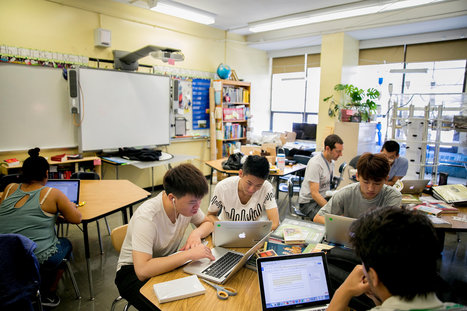


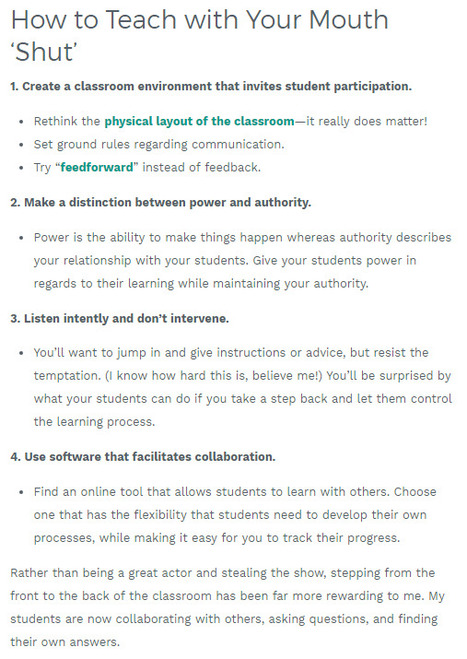



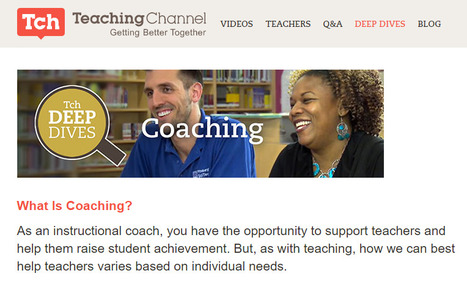
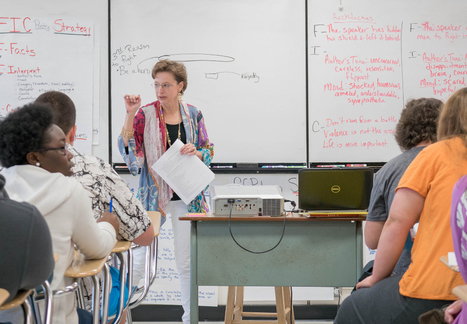



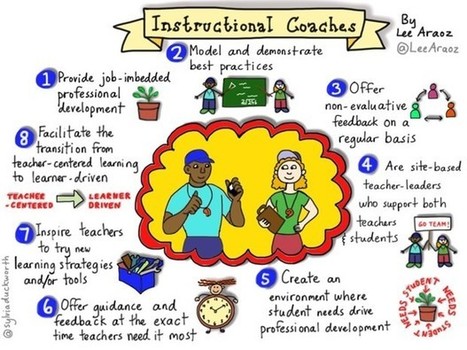







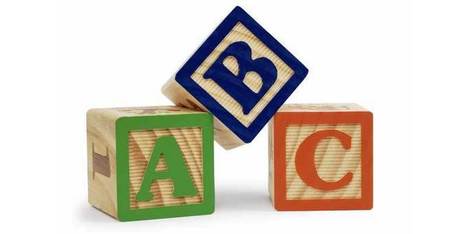

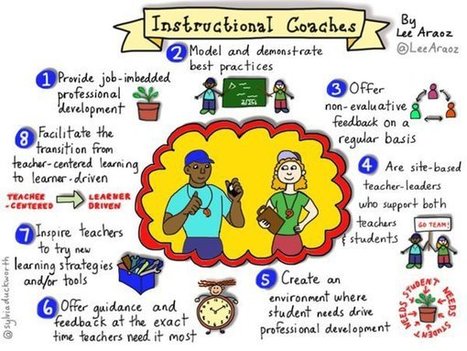



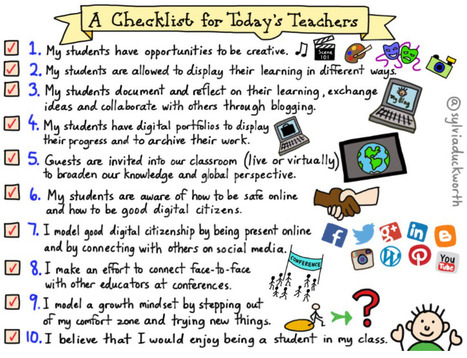


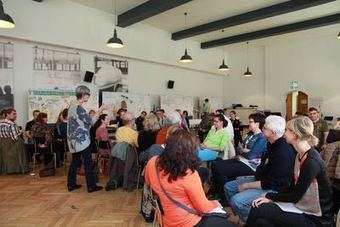




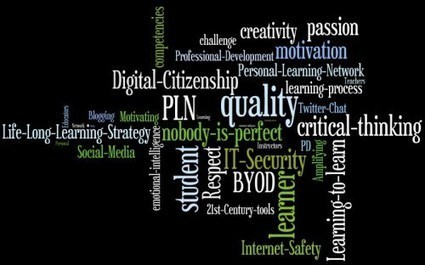






Solange sich Lehrende als primäre Informationsquelle sehen, als «Sender von Inhalt», solange bleibt die offene, digitalisierte Wissensgesellschaft zu erheblichen Teilen aussen vor. Hingegen entsteht starker Schub ins digitale Netz, sobald Dozierende sich in ihrer Haltung und ihrem Handeln zu Coaches entwickeln.
Learn more / En savoir plus / Mehr erfahren:
https://gustmees.wordpress.com/?s=coaching
https://www.scoop.it/t/21st-century-learning-and-teaching/?&tag=Coaching